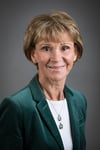
Marketing content shared with Michigan Business Network by:
Bonnie J. Knutson, PhD
The School of Hospitality Business
Broad College of Business
Michigan State University

If you think back to one of your World History classes, you may remember reading about Julius Caesar crossing the river Rubicon in 49 BC. According to some historians, as he crossed, he famously stated, alea iacta est, which loosely translated means “the die is cast.” Over time, Caesar’s utterance has come to mean that we are passing a point of no return.
Fast forward to November 15, 2022, when the world crossed another Rubicon. For it was on that date that demographers from the United Nation said that the world’s 8th billionth baby was born. The die is again cast. While no one knows the who, where, or specifically when this Rubicon was passed, population scientists believe that the world’s newest citizen was born in the southern hemisphere, with most projecting the birth occurring in India. This ties in with two significant projections: [1] India will soon overtake China as the most populous country in the world, and [2] Economic growth/impact is moving from north of the equator to the southern hemisphere. Think of the impact on hotel expansion, cultural differences, training, and immigration policies.
But it seems as if there are additional Rubicon crossings that will affect how we live, work, play, and operate our hotels. They will also impact how we deliver hospitality to our guests. Take energy for example, which can simply be defined as the capacity to do work. A half of a century ago, futurist Alvin Toffler developed a theory he called the Third Wave.i He speculated that the waves are based on how we can do work – i.e. energy. The first wave was driven by human and animal power, consequently, it was termed the agrarian wave. This was overtaken by the industrial age, based in large part, on energy produced by hydrocarbons. This second wave enabled the industrial era and was based on everything mass – production, markets, education, media, ad infinitum. This often led to centralized management, standardization, sameness, and “a style of organization we call bureaucracy.” It also led to what many called the cookie-cutter hotel as articulated in the quote: “Through all the nights he’d endured in cookie-cutter hotels…”ii
If you adhere to the trilogy that futurist Alvin Toffler put forth a half-century ago, The Department of Energy (DOE) began taking us across another Rubicon when it announced the scientific breakthrough in nuclear fusion, “a major step toward developing a new sustainable form of energy that releases virtually no carbon dioxide or other types of air pollution.” This discovery is projected to be a major step in the ability to generate large amounts of energy without burning fossil fuels. While large-scale applications are still years away, the DOE has at least put our toes into that river.
A third Rubicon is somewhat related to that 8th billionth baby. For the first time in history, there are six generations of guests in our hotels, and similarly five generations of our employees now welcoming these guests – the Greatest, the lesser Silent, the large Baby Boomers, followed by a smaller Generation X, the infamous Millennials, Generation Z, and Generation Alpha, the newest to be named. This last is the cohort born after 2011 and just beginning to enter the middle grades. And if you have recently been in Orlando’s land of the Mouse, you know they already have an impact on where families go, stay, and buy.
But it is Generation Z that is currently commanding a lot of our attention. While demographers may disagree as to when Gen Z began, most agree that 1996-1997 was the starting point. Numbering about 68.8 million people, they currently represent about 21 percent of the U.S. population. Sometimes nicknamed the Zoomers, the vanguard of this generation is now about 25 or 26 years old. They are leaving college, entering the workforce, and beginning to move up the proverbial corporate ladder. They are also traveling. They are likewise eating out. And they are working in our hotels.
The connection among these three Rubicon crossings is technology. I read somewhere that the whole nature of society – i.e. the relationship between people and organizations – is significantly altered by the impact of new technology. Ice box to refrigerator. Horse drawn wagon to electric vehicle. Pony-express to email. Printed menus to Q-Codes. Medieval inns to high-rise hotels, sprawling resorts, and Airbnbs. And we can’t forget online shopping, drive-thru windows, and door-to-door delivery.
To some degree, people’s lives are modified to serve the technology, changing the way people communicate and interact. For Baby Boomers it was television; for Generation X it was the computer, and for Millennials it was the Internet. But it is Generation Z that is leading the charge across this third river of transformation as it is the first truly digital generation. By the time they were in their formative years, Wi-Fi and high-band cellular service enabled them to
connect to the web on mobile devices anytime and anywhere. Social media, 24-7 communications, and on-demand entertainment were assumed; these were an integral part of the Gen X lifestyle.
While technologies – from data-driven analytics to robots delivering room service – continue to grow, hotels will still have to put the emphasis on people, not on technology. The coming year has been called the year of the customer, but every year is really the year of the customer or the employee. Start with personalization, which has been called the key to the customer’s heart. We have long known that the two most important words in the world are a person’s name. Today’s technology will allow that personalization to be integrated into your hotel’s marketing and operational operations – everything from the welcome screen on the room’s TV screen to that little room-service robot mimicking R2D2 by voicing the guest’s name the door is opened. It all comes down to that “everyone wants their 15-minutes of fame” mantra.
If the post-pandemic world has taught us anything, it has taught us that, for the hospitality industry, it cannot be developing a marketing plan aimed at convincing people to stay in or work in your hotel. The emphasis – indeed, the priority – has shifted towards providing amazing experiences that build loyalty, that elusive word-of-finger (no longer just word-of-mouth), and revenues. It will be Generation Z – the next generation of hospitality leaders – that will lead the charge across the technology Rubicon.
What they see as the main challenges in the future also brings us full circle to the original question posed in our first article. Is Technology a Virtuoso or a Vampire for our hospitality industry? Only time will tell. Hoteliers will have to put hip-waders on to wade across these three Rubicon rivers along with those that lie ahead.
In a previous article, we reported findings from a survey of current hospitality leaders about what hospitality will be in the coming years. Technology surfaced as an overarching Virtuoso-Vampire theme, raising the question of whether technology will be the Virtuoso that harmonized service delivery with guests’ expectations, or will it be the Vampire that sucks the spirit out of the hospitality industry and diminished a hotels’ revenues and/or capital?
In this article, you will learn what today’s Generation Z hospitality students -- tomorrow’s hospitality leaders – sees as the relationship between technology and hospitality?












